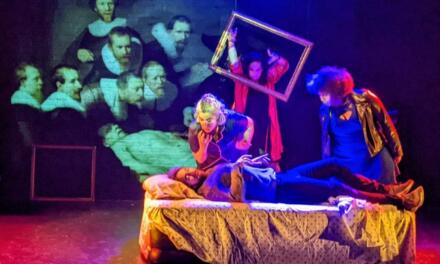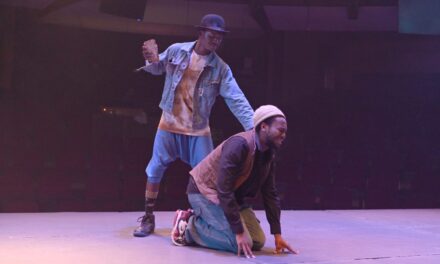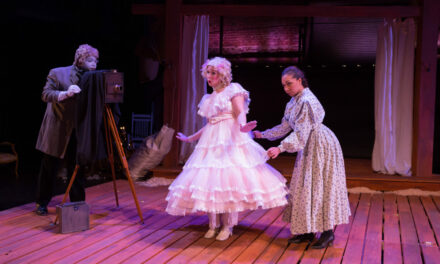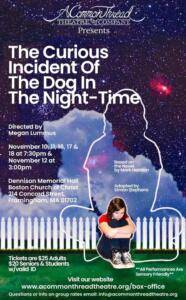
When Christopher Boone from A Curious Incident of the Dog in the Night-Time was first introduced in Mark Haddon’s 2003 novel, many speculated that Christopher was an autistic character. In the years that followed, the book was a popular selection for school classrooms and summer reading programs, and the character became a highly recognizable example of autistic coding, though Haddon has been very clear that he did not intend for Christopher to be seen as an explicitly autistic character. There are many well-structured arguments about the flaws in his autistic representation, but the overwhelming recognition of Christopher’s neurotype was cemented when Simon Stephens adapted Haddon’s novel in 2012 and Stephens chose to give Christopher an explicitly autistic identity.
In 2017, Mickey Rowe became the first autistic actor to play Christopher in a professional production of Curious Incident at the Indiana Repertory Theatre (IRT) and Syracuse Stage, directed by Risa Brainin. This was a historic moment that many in the Autistic Community had been calling for since the play debuted. The issue of authentic representation has been more slowly applied to disability culture especially invisible disabilities represented in theatre, film, and television.
In Framingham, MA, A Common Thread Theatre Company (ACTTC) is exploring these issues of representation with their upcoming production of Curious Incident. ACTTC will present the first autistic-led production of the show, with both an autistic director and lead actor, and will be exploring not only a more accurate representation of autistic experience but also tackling a different gender presentation for the main protagonist.
Autistic actress Katherine McCrackin (@katherine.mccrackin) will present the main character as Chris, a 15-year-old autistic girl navigating the journey to investigate who killed her neighbor’s dog, Wellington. In collaboration with director Megan Lummus (@meganlummusdirector), who also recently confirmed her autistic identity, the duo is tackling the stereotypical and sometimes offensive way the original character was written by both the neurotypical author and playwright. Christopher in both the novel and the play is often panned by autistic critics who point to how closely the way he is written meets the diagnostic criteria for autism in the DSM-IV or DSM-V. Recent research does link C-PTSD with the autistic population as significantly more common than in neurotypical peer groups. Some autistic individuals theorize, based on their own lived experience, that many of the behaviors listed as diagnostic criteria are more accurately described as criteria for autistic trauma response.

Katherine McCrackin, the actress playing Chris.
“[T]he dynamics of all the relationships are different because the relationship between a father and a son I think is very different than a father and a daughter . . . how Chris is treated by the people around her changes because the character in the script is a little infantilized, in the way that neurotypical people infantilize autistic people. But there’s another layer: how society infantilizes women, so there are multiple layers that become more highlighted when you gender swap the character,” said Lummus. McCracken added, “In addition to the parental relationships, there are scenes where Chris is on stage and everyone’s talking over her and she’s trying to get her opinion in . . . and no one is taking her view into account. That’s very common for both autistic people and for women, so it adds a whole layer of misogyny in addition to ableism. . . . showing a girl portraying a number of those negative stereotypes of being loud, or violent, or angry, that women traditionally aren’t allowed to be – there’s a reason autistic girls learn to mask from a younger age – hits different than having a 15-year-old boy do that, because we don’t get the same kind of pass from the audience that boys do.”
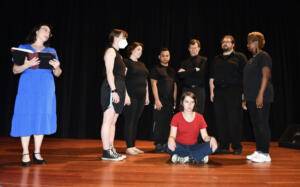
For Lummus, directing this show as an openly autistic person is especially meaningful. “[I]t‘s important to have representation on stage, 1,000%, and have them be represented by people with that lived experience. But it’s also important to have it behind the table, especially in a position of leadership and responsibility and stress when society doesn’t think that autistic people can have roles that have leadership and responsibility and stress, and being able to do that is huge . . . I’m autistic and that’s the reason I can do these things. I’m not doing it in spite of, I’m doing it because of.”

Megan Lummus, Director
The mission for both McCrackin and Lummus in this production is to present an authentic representation of autistic life, based on their own lived experiences. This production is both for those who come and find self-recognition in Chris and for those who may struggle to understand her. They ask only that the audience come with an open mind and try to find empathy for Chris and her circumstances. As Lummus said, “I’m hoping that through this show, [the audience] can watch it and they can understand and see themselves in Chris and understand that being autistic is being human. It’s just being human in a way that you might not be, but that doesn’t make it wrong, or broken, or something that needs to be fixed or cured. You just need to learn how to accommodate for it, so that we can all live happy and successful lives.”
Performances will be at the Dennison Memorial Hall, Boston Church of Christ, 214 Concord Street, Framingham, MA. November 10, 11, 16, 17, and 18 at 7:30 pm and November 12 at 3:00 pm. Tickets are $25 for Adult Admission and $20 for Seniors and Students with a valid ID. Visit https://www.acommonthreadtheatre.org/box-office to book your tickets. Questions or requests for information about group rates can be sent to info@acommonthreadtheatre.org.
Please note that *all* performances will be sensory-friendly.
This post was written by the author in their personal capacity.The opinions expressed in this article are the author’s own and do not reflect the view of The Theatre Times, their staff or collaborators.
This post was written by Jenna Lourenco.
The views expressed here belong to the author and do not necessarily reflect our views and opinions.


